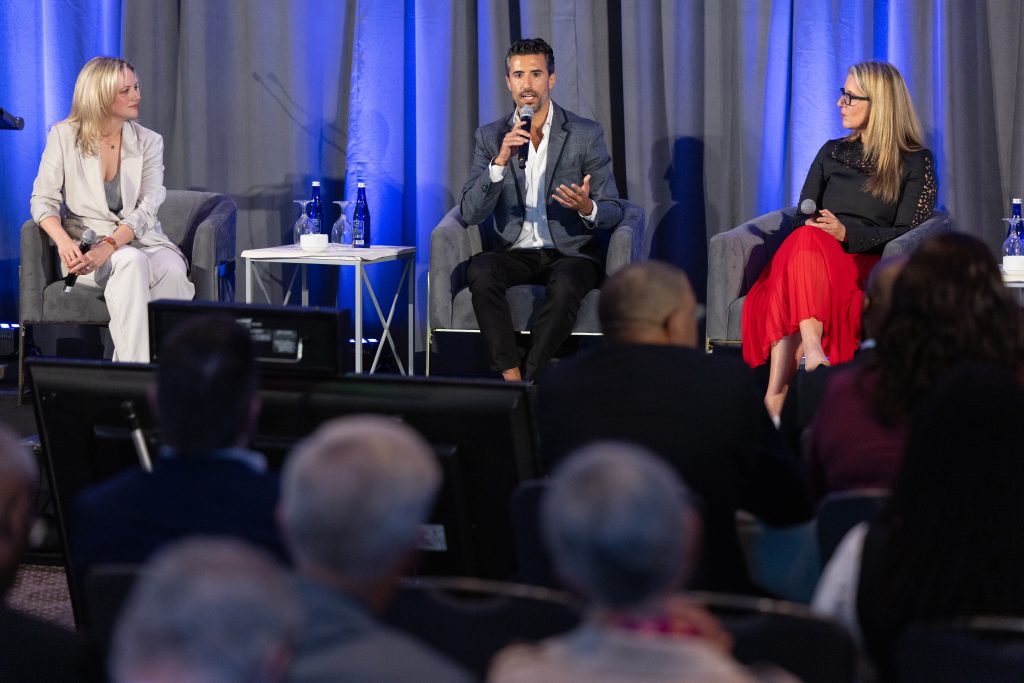Above, from left: Rebecca Thomson, Rory Golod, Stephanie Anton and Todd Sumney. Photo by AJ Canaria.
In the post-Burnett new normal of the real estate industry, brokerage growth has hit a wall for many. Trying to expand and stay afloat amid market challenges has prevented many brokerages from being able to expand their market share through more traditional methods, turning to mergers and acquisitions as the best way to grow.
This is what several brokerage leaders dove into during the panel titled “Survival of the Fittest: Is Consolidation a Good Thing?” at RISMedia’s recent CEO & Leadership Exchange. Moderated by Todd Sumney, chief industry officer of HomeSmart, panelists Rebecca Thomson, national vice president of Coldwell Banker Realty; Rory Golod, president of Growth, Communications & the West Region at Compass; and Stephanie Anton, president of Corcoran Affiliates discussed the how and why as well as the outcomes they’ve seen behind the ramped up opportunities for mergers and acquisitions.
Sumney opened the discussion by noting the prevalence of consolidation in recent times and how it has led to positive outcomes for those taking advantage, something all three panelists agreed with.
Golod said right off the bat that financial reasons are the biggest driver and positive outcome he’s seen from consolidation. He said that as “just about every brokerage is making a lot less money than they used to” and the “economics are getting worse and worse and worse,” it’s harder to stay afloat without combining forces to get more transactions.
Also, in terms of financials, while Sumney noted that brokerages often succeed through building and owning their technology, Golod said it is “becoming impossible” and the “cost is too high” to do this—another reason to pursue consolidation. Combining finances and forces can give brokerages the opportunity to pursue the technological advances they need to succeed.
 Anton also noted that consolidation doesn’t just contribute to technology, as “it can be just having a recruiting resource that’s centralized.”
Anton also noted that consolidation doesn’t just contribute to technology, as “it can be just having a recruiting resource that’s centralized.”
“Everything doesn’t have to be recreated locally every time,” she explained. “A big part of what we do is help our affiliates recruit agents. We help identify that, and we help fund that. Those are sort of great ways to back up the house, ways to power a brokerage in a different way.”
Thomson continued the conversation, noting that when her brokerage looks at consolidation, “it’s also driving efficiencies and finding ways to automate or leverage other resources.”
“What does that mean we can now give back or focus more on,” she said.
Anton added that “it’s also how we make sure that there’s a fit, there’s a benefit to both parties.” Beyond profitability, consolidation promotes company culture, she said.
“This owner now gets to have fun, and whoever their network was sees that and responds to that, and across the number of brands that we represent, there becomes this great affinity,” she continued. “Being a part of a whole, a bigger whole, I think, is such a huge driver for people right now.”
Golod circled back to the financial conversation to explain that Thomson’s note of looking to give back to acquired or merged brokerages is a big driver for consolidation. He said that the “problem is it’s becoming harder and harder to give your agents the best in a world where the cost of doing that is so high.”
“I think brokerage owners are saying, ‘What’s the place that my agents can go, where I can give them the best technology, student support, referral network, marketing, listing strategies,’” he continued. “Those are usually the decisions as to why people end up wanting to sell their company.”
Sumney added to the conversation with his take that “at times, acquisitions, consolidation is someone seeking out expertise. They’re seeking out the leadership that the larger organization brings to the table.”
Panelists rounded out the conversation by noting that the ideas around consolidation need to change as the industry changes. In fact, Golod said that while consolidation used to be viewed as a loss to some broker/owners, with the new normal of the industry, it’s definitely a win.
“You built something that was worth someone else paying you real money for, and that’s amazing,” he said. “There are hundreds of thousands of people in our industry who don’t even get that far. I think we need to change that concept.”












